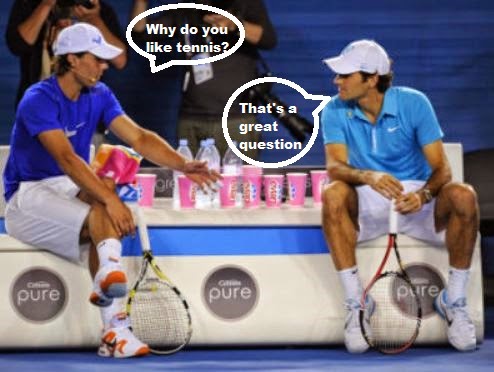In my last blog I mentioned the conversation analogy to tennis and introduced the "first serve" question. A good conversation though depends on partnership returns and volleys.
While the initial serve is important, it could be the serve went wide and a weak or non existent return came back (e.g. a one sentence response with a long silent pause). Don’t panic but be prepared - a good "first serve" can anticipate a weak return (Remember #3 in the last blog - Pick a subject and question that has natural and easy follow-on questions).
At this point you have two options – let the subject go and re-serve or attempt the volley. My preference (if the ball didn’t go into the net) is to attempt the volley.
There are two types of Volleys:
A. Immediate Volley – no bounce (when you have the least desire to talk):
 |
| Immediate Volley - Tell me More |
(1) “Tell me more” - Say only those three words and out wait the uncomfortable silence
(2) Why …. Why did you …. Why not.
(3) “That’s interesting how did you decide that”?
(4) “I’m not sure I understand could you explain what you meant about ….
(5) “What was your thinking?
(6) “Who else was with you?
B. Standard Volley – you talk and give the other person time to collect their thoughts. Remember they may be just as stressful as you at conversational play. If the other player is a cooperative conversationalist and the volleys look easy then take your time and help extend the volley with sharing your own information. Reveal some related information about the subject (or yourself) and prepare a methodical smooth follow-on.
 |
| Respond and Prepare a Smooth Follow Through |
Here are some suggested conversational fillers giving the other player time to think:
(1) “Same with me … I ……
(2) “ I agree … for me it’s like …….
(3) “I had a similar experience when ….
(4) “That’s exactly like the time I …….
Now prepare your stroke and smoothly follow through with another question:
(1) What else do you remember about ……
(2) How did you feel when ……
(3) Was that the first time or has this happened before?
(4) Why did you …..
Notice the follow on question attempts to understand their thinking, feeling, memories, other related experiences. Like a detective you are probing for more information. Done correctly it proves you are listening intently to their response and want to keep the ball in play.
Above all - remember to calmly and methodically enjoy the conversational rhythm of the volley.






















